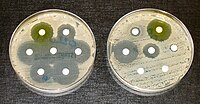
Photo from wikipedia
Currently, the effects of high antibiotic concentrations on the performance of microbiota and antibiotic resistance genes (ARGs) in activated sludge (AS) process are not well characterized. Lab-scale batch reactors were… Click to show full abstract
Currently, the effects of high antibiotic concentrations on the performance of microbiota and antibiotic resistance genes (ARGs) in activated sludge (AS) process are not well characterized. Lab-scale batch reactors were performed to evaluate the dynamics of microbial community and ARGs in response to six antibiotics at different concentrations using high-throughput sequencing-based 16S rRNA gene and metagenomic analyses. The presence of antibiotics remarkably decreased the microbial diversity, caused a great change of the microbiota structure, and exerted a selective pressure on the enrichment of potential antibiotic resistant bacteria (ARB), such as Arthrobacter, Thauera, Geothrix, Rudaea, Aridibacter, Conexibacter, Terrimonas, etc. High antibiotic selective pressures increased ARG abundance but simultaneously reduced ARG number. In total, 491 ARG subtypes belonging to 20 ARG types were detected and kanamycin treatment showed the highest ARG abundances. A core set of 54 ARG subtypes that accounted for 66.7%-99.6% of the total ARG abundances were shared by all samples. The increase of the abundances of both corresponding and non-corresponding ARGs under a specific antibiotic treatment revealed the collateral effects of antibiotic selective pressure. Microbial community may play an important role in the composition of ARGs. Network analysis indicated that both internal-type and external-type of ARGs exhibited higher non-random co-occurrence incidences and 18 genera were speculated as the possible hosts for multiple ARGs. This study deciphered the profiles and relationships between microbial community and ARGs in AS process treating wastewater with high antibiotic concentrations and could provide helpful guidance for controlling the development and dissemination of ARB and ARGs.
Journal Title: Water research
Year Published: 2019
Link to full text (if available)
Share on Social Media: Sign Up to like & get
recommendations!